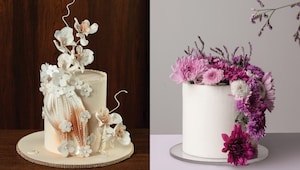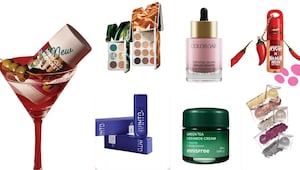
How New York-Based South Asian musicians Indo Warehouse are rewriting the rules of music
Co-founders of the record label open up to Cosmo India about expensive underwear, being workaholics, and performing at Coachella later this year.

If Indo Warehouse isn’t already living in your head rent-free, it’s about to be. This New York-based South Asian collective is rewriting the rules of music. Fresh off an Asia tour, founders Kunal Merchant and Kahani took a breather (just barely) to chat with us.
Cosmo India: How did Indo Warehouse start, and how did the two of you meet?
Kahani: During COVID, I was in Mexico, immersed in a lot of electronic music, and experimenting with some sounds. When I got back to New York, there was a lot of interest in the music I had been posting. One thing led to another, and I ended up creating a Spotify playlist of the little South Asian electronic music that I could find. The playlist was called ‘Indo Warehouse’, so that’s the story behind the name. As soon as I published that, everyone was talking about it. And that’s when, a few months later, in February 2022, I thought, “Hey, let’s try this out in real life and play it to a live audience.” What I really wanted to do was bring people into a room to experience the music, because it’s one thing to hear it at home on Spotify, it’s another to actually be immersed in it.
Every month thereafter, we kind of doubled up in size.
As for Kunal and I meeting, we both lived in New York at the time but didn’t really know each other. I knew that Kunal was a DJ and an aficionado of electronic music in New York. Me, I didn’t come from a place of knowing anything about electronic music really, I came from a place of loving South Asian music. But knowing that he understood the width and gravity of electronic music, I was like, “I would love to get your feedback.”
So I invited him out to the first show. A few months later, Kunal joined in to become a partner in the brand. By the end of the year, we had the opportunity to bring the show to Avant Gardner, one of the most legendary venues in New York. The next year, we were on a mission to take it around North America, and we did! It was super successful, and the majority of shows sold out. Then fast forward again, year three, we did an entire lap of the world. And here we are today, growing and expanding on all fronts, with Kunal and I at the helm.
C: You’ve mentioned that your year-on-year growth has been exponential. Say more…
Kahani: In the beginning, it wasn’t really set up with the intention to have an official roster per se. We knew that was going to come in time. So in year one and a good chunk of year two, the goal was really to find the best talent, who we thought really understood what we’re about and wanted to be in it for the long haul. And so we’d find artists who we felt were doing something unique. We were trying to get artists from all over, you know, not just our local New York area. But, now we are more focused on building the roster and the label. So going into this year, I think that’s a big expansion for us, signing new artists, searching for new talent, really focusing on the A&R side of things.
Kunal: Yeah, and we recently signed an incredible artist duo called Anvaya. They’re the first official artists signed to Indo Warehouse as a label and management company. We’re so excited to share their music and they have an incredible project on the horizon.
C: Tell us a bit about growing up.
Kunal: So I was born and raised in Houston, Texas, and over time made friends with a lot of Indians.
It’s really ironic how life brings opportunities your way. Because when I was a kid, my parents really have always been into classical Indian music. And they tried everything they could to get me to learn. They would force me to go learn tabla and take harmonium and singing lessons. They took me to all sorts of concerts. And I, as a young kid, was not into it at all. And here I am many years later, part of a group that is pushing South Asian music to the world.
Kahani: I’m the complete opposite, which is the common thread between us in our history. I grew up in New York, born and raised. And yeah, I did not grow up around South Asians at all. I didn’t really interact or befriend a lot of South Asians until college. I loved music from a very young age, but I did not learn any South Asian instruments at all. I learnt piano for about 12-15 years. I played drums for 10. But all I actually wish I could have learnt was tabla and harmonium. In my spare time, all I wanted to do was listen to South Asian music. I loved old qawwalis, Punjabi, and Bollywood music. I was hooked. But it was something that I could not share with my peers in school, because I didn’t have any South Asian friends. So I was very isolated in that desire.
C: What was the first Indo Warehouse event like?
Kahani: Oh man, it was beautiful. I had invited Kunal to experience it. It was on February 26, 2022, in a small but very unique jazz club in New York City. But I think one of the most interesting things was that if you look at the timeline of things, the playlist was just published about three months prior to this, and marketing for this event took place maybe four or five weeks before. That being said, we sold out. The fact that 200 people bought tickets for it without having any idea what it was felt really good. But at the same time, there was a lot of good anxiety around it. I remember thinking, “Okay, we’ve sold out, but no one knows what this is. We just have to deliver now.” Indo Warehouse is always very experience-driven. It’s not just about the music. It’s about the moment a customer steps out of the cab and walks up to the venue, goes through the check-in process, walks through the door, and is greeted by someone who says, “Welcome to Indo Warehouse”.
Many people would tell us, “Oh, I made so many new friends at your show. We would have never met unless it was for Indo Warehouse.” And so quickly the community was starting to build.
C: What are you doing when you’re not making music?
Kunal: That’s a tough question. I think, right now for me, I really enjoy the process that we’re in, of trying to build a brand, which requires a lot of attention. But outside of Indo Warehouse, I think…
Kahani: Can I pause you for a second? I think what he means is we are workaholics. And, I wish we could answer that with a more fun answer. It takes up so much of our time, but we’re not complaining. We’re working really hard right now to turn this into an established business that can grow and sustain in order for us to realistically be able to do other things that we just can’t right now.
C: Yeah, but Kunal was mentioning something he is doing?
Kunal: I was kind of lying (laughs). I was gonna say cooking, but you know what, I actually cook far less than I did when I had a full-time job. I think we want to get back to some sense of normalcy. But, right now, we just have to put all our focus here. Like I don’t even know what free time is.
Kahani: Honestly, I miss certain things that I did in the past, like dancing, and I don’t know if I’ll ever get back to it. Sometimes I think about how being so glued to the music industry has unintentionally made us step away from being up to date on what’s happening in other sectors. So I think there’s a desire to, first and foremost, just be able to do that.
C: Tell us something funny that happened on tour.
Kunal: Oh! I have one. I’m sure Cosmo readers want to hear about underwear.
C: Oh yes, they do.
Kunal: So one of the things that happens on the road, even if you’re travelling with multiple suitcases, is that you run out of clothes. Plus laundry, when you’re staying in hotels, is very expensive. So the laundry in this location we were at was something like $10 (₹860 approx) a T-shirt, right? And that felt absurd. So I thought, you know what, let me just go buy some new basics, mostly just a couple of T-shirts, underwear, and socks. So I go to Calvin Klein and buy the underwear that I typically wear. I pick out 10 pairs and am like “Alright I’m good, I don’t have to do laundry for the rest of the tour.” I go to the check out, and when I get the number it’s in a different language. Turns out, I did the math wrong. I thought it was gonna be like $150 (₹12,900 approx), but it ended up being $480 (₹41,570 approx), which is a lot for underwear. So I went back to the store and tried to return it, but couldn’t. I was like “Damn man, I just spent $480 (₹41,570 approx) on underwear.” I could’ve done all my laundry probably twice for that amount, but you live and you learn.
C: Well, now you have lots of new underwear, so let’s look at the bright side. You’re performing at Coachella this year. How does that feel? Not a great segue, we know.
Kahani: It feels amazing. You know, there’s literally footage of me from the first Indo Warehouse show where I am walking around and being like, “You know we’re gonna take this around the world, we’re gonna talk to the folks at Coachella and get stage time.” And to think that within three years we’re here, it’s a really good feeling—very validating.
And they’re listening to...
Aria by Foozak

Curry by makaan

Talk To Me by Champion, Four Tet, Skrillex, Naisha

Pakpak by Sébastien Léger

Rasiya by Anyasa, Isheeta Chakrvarty

All images: Sharmeen Chaudhary; Album covers: Apple Music
This article originally appeared in Jan-Feb 2025 print edition of Cosmopolitan India.
Also read: The music industry is undergoing an astronomical revolution led by female artists
Also read: “I was really focused on emitting pure love,” Indian-American singer Raveena on her latest album
more from Life

Is Gen Z going analogue amid an epidemic of disconnection?

Inside the rise of impossible-to-ignore cakes and the bakers making them worth the splurge

Suvir Saran would like you to clean your glasses

This Valentine’s Day, skip the reservations and cook up romance instead with TTK Prestige

Genius hack or pathway to loneliness? The dawn of dating’s spreadsheet era

I tried Pantene's Bond Repair Conditioner and here’s what it changed about my styling routine

Low-rise jeans are squeezing back into fashion—here’s how to wear them in 2026

I travel for a living—these are the top 15 tips I've learned to avoid skin freak-outs and overweight luggage

All the hottest beauty finds that make us sit up and take notice

Will we ever stop hating it when women propose to men?
